小学英语语法写作
小学英语语法知识总结6篇

小学英语语法知识总结6篇英语语法是针对英语语言进行研究后,系统地总结归纳出来的一系列语言规则。
英语语法的精髓在于掌握语言的使用。
那么具体该如何总结呢?下面是为大家整理的小学英语语法知识总结6篇,希望大家能有所收获。
小学英语语法知识总结1一般过去时态(a) be 动词的过去式:I/He/she/it was(not)…. You/we/they were….一般疑问句was, were 放在句首。
(b) 动词过去式:肯定句:I watched cartoons.She visited the zoo.一般疑问句:Did you read book last night? Yes, I did. No, I didn’t.Did she clean the desk just now? Yes, she did. No, she didn’t.否定句:They didn’t go the the part yesterday.He didn’t make model ships last week.动词过去式变化规则:1.一般在动词末尾加-ed,如:pull-pulled, cook-cooked2.结尾是e加d,如:taste-tasted3.末尾是辅音字母加一个元音字母和一个辅音字母的重读闭音节,应双写末尾的辅音字母,再加-ed,如:stop-stopped4.以“辅音字母+y”结尾的,变y为i,再加-ed,如:study-studied5.不规则动词过去式:am,is-was,are-were,do-did,see-saw,say-said,give-gave,get-got,go-went,come-came,have-had,eat-ate,take-took,run-ran,sing-sang,put-put,make-made,read-read,write-wrote,draw-drew,drink-drank,swim-swam,sit-sat小学英语语法知识总结2动词加ing的变化规则1.一般情况下,直接加ing,如:cook-cooking2.以不发音的e结尾,去e加ing,如:make-making, taste-tasting3.如果末尾是辅音字母加一个元音字母和一个辅音字母,双写末尾的辅音字母,再加ing,如:run-running, stop-stopping 现在进行时,用来表示正在进行或发生的动作。
小学英语语法大全(完整版)(可打印)
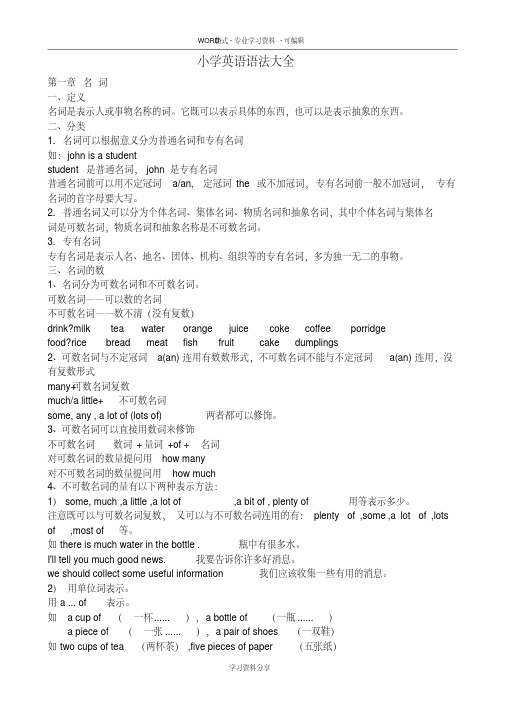
小学英语语法大全第一章名词一、定义名词是表示人或事物名称的词。
它既可以表示具体的东西,也可以是表示抽象的东西。
二、分类1. 名词可以根据意义分为普通名词和专有名词如:john is a studentstudent是普通名词,john是专有名词普通名词前可以用不定冠词a/an, 定冠词the 或不加冠词,专有名词前一般不加冠词,专有名词的首字母要大写。
2. 普通名词又可以分为个体名词、集体名词、物质名词和抽象名词,其中个体名词与集体名词是可数名词,物质名词和抽象名称是不可数名词。
3. 专有名词专有名词是表示人名、地名、团体、机构、组织等的专有名词,多为独一无二的事物。
三、名词的数1、名词分为可数名词和不可数名词。
可数名词——可以数的名词不可数名词——数不清(没有复数)drink?milk tea water orange juice coke coffee porridgefood?rice bread meat fish fruit cake dumplings2、可数名词与不定冠词a(an)连用有数数形式,不可数名词不能与不定冠词a(an)连用,没有复数形式many+可数名词复数much/a little+不可数名词some, any , a lot of (lots of) 两者都可以修饰。
3、可数名词可以直接用数词来修饰不可数名词数词 +量词 +of + 名词对可数名词的数量提问用how many对不可数名词的数量提问用 how much4、不可数名词的量有以下两种表示方法:1) some, much ,a little ,a lot of ,a bit of , plenty of 用等表示多少。
注意既可以与可数名词复数,又可以与不可数名词连用的有:plenty of ,some ,a lot of ,lots of ,most of 等。
如there is much water in the bottle .瓶中有很多水。
小学英语四年级语法练习【三篇】
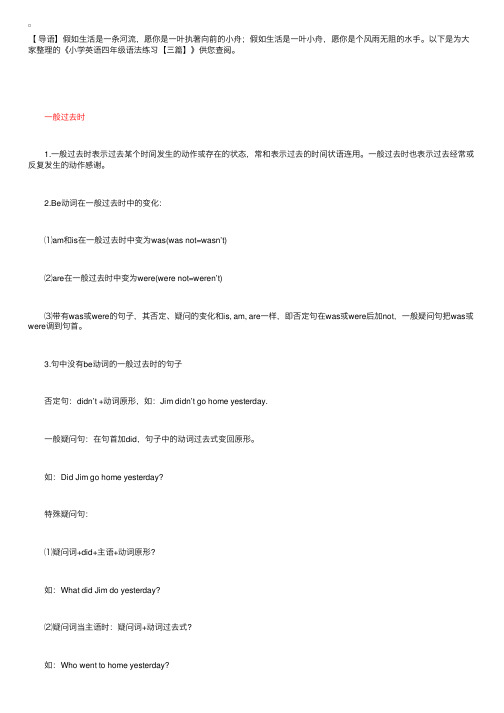
【导语】假如⽣活是⼀条河流,愿你是⼀叶执著向前的⼩⾈;假如⽣活是⼀叶⼩⾈,愿你是个风⾬⽆阻的⽔⼿。
以下是为⼤家整理的《⼩学英语四年级语法练习【三篇】》供您查阅。
⼀般过去时 1.⼀般过去时表⽰过去某个时间发⽣的动作或存在的状态,常和表⽰过去的时间状语连⽤。
⼀般过去时也表⽰过去经常或反复发⽣的动作感谢。
2.Be动词在⼀般过去时中的变化: ⑴am和is在⼀般过去时中变为was(was not=wasn’t) ⑵are在⼀般过去时中变为were(were not=weren’t) ⑶带有was或were的句⼦,其否定、疑问的变化和is, am, are⼀样,即否定句在was或were后加not,⼀般疑问句把was或were调到句⾸。
3.句中没有be动词的⼀般过去时的句⼦ 否定句:didn’t +动词原形,如:Jim didn’t go home yesterday. ⼀般疑问句:在句⾸加did,句⼦中的动词过去式变回原形。
如:Did Jim go home yesterday? 特殊疑问句: ⑴疑问词+did+主语+动词原形? 如:What did Jim do yesterday? ⑵疑问词当主语时:疑问词+动词过去式? 如:Who went to home yesterday? ⼀般现在时 其动词形式是:动词原形(只有第三⼈称单数作主语时除外,要加-s)其疑问句和否定句需要⽤助动词do或does 1) 肯定句⽤⾏为动词原形表⽰ They get up very early every morning. 他们每天早晨起来很早。
I visit my grandparents four times a month. 我⼀个⽉去看望祖⽗母四次。
2) 否定句⽤don’t + 动词原形来表⽰ We do not go shopping on Sundays. 我们周⽇不去购物。
I don’t think you like this colour. 我想你不喜欢这个颜⾊。
【精选】小学五年级英语作文25篇
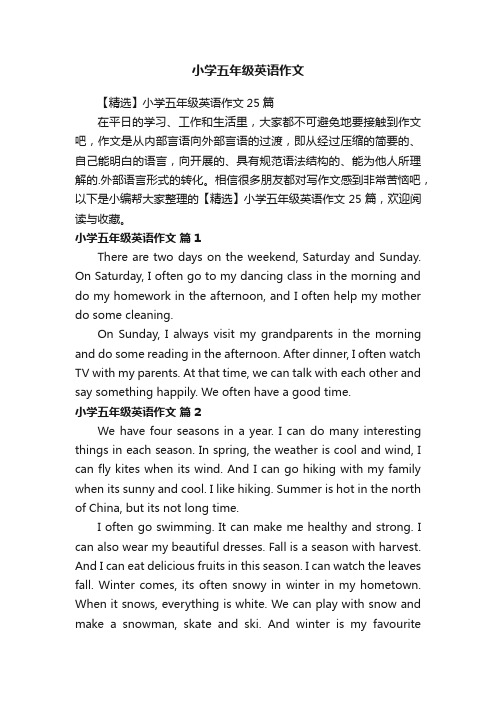
小学五年级英语作文【精选】小学五年级英语作文25篇在平日的学习、工作和生活里,大家都不可避免地要接触到作文吧,作文是从内部言语向外部言语的过渡,即从经过压缩的简要的、自己能明白的语言,向开展的、具有规范语法结构的、能为他人所理解的.外部语言形式的转化。
相信很多朋友都对写作文感到非常苦恼吧,以下是小编帮大家整理的【精选】小学五年级英语作文25篇,欢迎阅读与收藏。
小学五年级英语作文篇1There are two days on the weekend, Saturday and Sunday. On Saturday, I often go to my dancing class in the morning and do my homework in the afternoon, and I often help my mother do some cleaning.On Sunday, I always visit my grandparents in the morning and do some reading in the afternoon. After dinner, I often watch TV with my parents. At that time, we can talk with each other and say something happily. We often have a good time.小学五年级英语作文篇2We have four seasons in a year. I can do many interesting things in each season. In spring, the weather is cool and wind, I can fly kites when its wind. And I can go hiking with my family when its sunny and cool. I like hiking. Summer is hot in the north of China, but its not long time.I often go swimming. It can make me healthy and strong. I can also wear my beautiful dresses. Fall is a season with harvest. And I can eat delicious fruits in this season. I can watch the leaves fall. Winter comes, its often snowy in winter in my hometown. When it snows, everything is white. We can play with snow and make a snowman, skate and ski. And winter is my favouriteseason, because of the Spring Festival. I love seasons. I love the nature.小学五年级英语作文篇3Who is your favorite people? My favorite people is my mother. She is beautiful. She is 38 years old. She is tall and thin. She has big eyes and long hair.She likes cooking. She cooks good meals for us every day. And she always does all the housework. She looks after my father and me. I love my mother very much.小学五年级英语作文篇4My English teacher has a big house.It has a living room, a big dining room, two bedrooms, a study, two bathrooms and a big kitchen.In the living room, there is a big picture, four brown sofas, white fans and blue walls. The TV set is big. There is a big Chinese knot on the wall. There are lanterns below the lights. I like them.This is my English teacher’s house.我的英语老师有一所大房子。
英语语法让我头疼小学作文

英语语法让我头疼小学作文全文共3篇示例,供读者参考篇1English Grammar Makes Me HeadacheAs a primary school student, learning English is a new and exciting challenge. However, one aspect of the language that often causes me frustration is grammar. English grammar rules can be complex and sometimes difficult to understand. Whether it's understanding verb tenses, punctuation rules, or sentence structure, I often find myself scratching my head in confusion.One of the most challenging aspects of English grammar for me is understanding verb tenses. There are so many rules to remember, such as the difference between present simple and present continuous, past simple and past continuous, and future tenses. It can be confusing to know when to use each tense correctly in a sentence. I often get mixed up and end up using the wrong tense, which can make my sentences sound awkward or confusing.Punctuation is another area of English grammar that gives me a headache. Knowing where to place commas, periods,question marks, and exclamation points in a sentence can be tricky. Sometimes I forget to use punctuation altogether, making my writing hard to read and understand. Other times, I overuse punctuation, which can make my writing seem choppy or disjointed. Finding the right balance of punctuation is something I still struggle with.Sentence structure is yet another aspect of English grammar that confuses me. Knowing how to structure a sentence correctly with subjects, verbs, and objects can be challenging. Sometimes I end up with run-on sentences that are too long and confusing. Other times, my sentences are too short and lack detail. Finding the right balance of sentence structure is something I am still working on improving.Despite the challenges of learning English grammar, I know that practice makes perfect. By studying grammar rules, practicing writing sentences, and asking for help when I need it, I can improve my understanding of English grammar. I know that with time and effort, I will become more confident in my grammar skills and be able to express myself more clearly and effectively in English.In conclusion, English grammar may give me a headache at times, but I am determined to conquer it. With perseverance andpractice, I know that I can overcome the challenges of learning English grammar and become a more proficient English speaker and writer.篇2English Grammar Gives Me a HeadacheEnglish grammar is a subject that many students find challenging. The rules and exceptions can be overwhelming, leading to confusion and frustration. As a primary school student, I often struggle with the intricacies of English grammar, and it can feel like a never-ending battle to grasp all the rules and apply them correctly.One of the most daunting aspects of English grammar is the sheer number of rules that need to be memorized. From subject-verb agreement to tenses and sentence structure, there are countless rules that govern how we use the English language. Trying to remember all of these rules can be overwhelming, especially for young students who are still developing their language skills.Another challenge of English grammar is the exceptions to the rules. Just when you think you have a rule figured out, you come across an exception that throws everything off. Theseexceptions can be tricky to navigate, and they can make it difficult to apply the rules consistently. For students like me who prefer clear, straightforward guidelines, the exceptions can be a major source of frustration.In addition to the rules and exceptions, English grammar also requires a good understanding of vocabulary and syntax. Knowing which words to use and where to place them in a sentence is essential for conveying meaning effectively. This can be especially challenging for students who are still building their vocabulary and struggling to express themselves in English.Despite the difficulties that come with learning English grammar, I know that it is an essential skill that I need to master. Clear communication is crucial in both academic and professional settings, and having a strong grasp of grammar can help me express my thoughts and ideas effectively. So, even though English grammar may give me a headache at times, I am determined to keep learning and improving my skills.In conclusion, English grammar is a challenging subject that can be overwhelming for students, especially at the primary school level. The rules, exceptions, vocabulary, and syntax all require careful attention and practice to master. Despite thechallenges, I am committed to developing my English grammar skills so that I can communicate effectively in the future.篇3English grammar makes my head ache. As a primary school student, I have always struggled with the rules and structures of the English language. From the differences between "there", "their" and "they're" to the various tenses and verb forms, I find myself constantly getting confused and frustrated.One of the most challenging aspects of English grammar for me is the use of articles. Knowing when to use "a", "an" or "the" seems like such a simple task, but I often find myself making mistakes. I have a hard time remembering all the rules and exceptions that come with articles, and it can be really frustrating when I get them wrong.Another aspect of English grammar that gives me trouble is verb conjugation. With so many irregular verbs and exceptions to the rules, it can be difficult to remember how to conjugate each verb correctly. I often mix up the past tense, present tense and future tense forms of verbs, which can lead to confusing sentences and misunderstandings.Punctuation is another area where I struggle. Knowing when to use a comma, semicolon, or dash can be confusing, and I often find myself overusing or underusing punctuation marks. It can be hard to remember all the rules and guidelines for proper punctuation, and this can lead to me making mistakes in my writing.Despite all these challenges, I know that improving my understanding of English grammar is important. By studying hard, practicing regularly, and seeking help from teachers and tutors, I hope to become more confident and proficient in using correct grammar. I know that with time and effort, I can overcome my struggles and master the rules of English grammar.。
上海小学二年级英语语法归纳总结
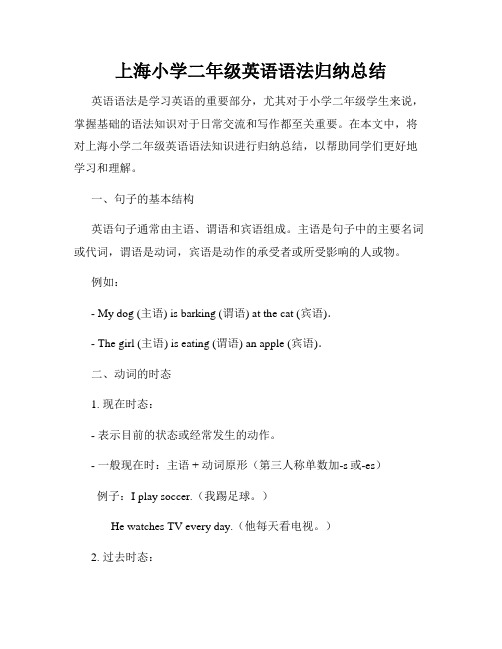
上海小学二年级英语语法归纳总结英语语法是学习英语的重要部分,尤其对于小学二年级学生来说,掌握基础的语法知识对于日常交流和写作都至关重要。
在本文中,将对上海小学二年级英语语法知识进行归纳总结,以帮助同学们更好地学习和理解。
一、句子的基本结构英语句子通常由主语、谓语和宾语组成。
主语是句子中的主要名词或代词,谓语是动词,宾语是动作的承受者或所受影响的人或物。
例如:- My dog (主语) is barking (谓语) at the cat (宾语).- The girl (主语) is eating (谓语) an apple (宾语).二、动词的时态1. 现在时态:- 表示目前的状态或经常发生的动作。
- 一般现在时:主语 + 动词原形(第三人称单数加-s或-es)例子:I play soccer.(我踢足球。
)He watches TV every day.(他每天看电视。
)2. 过去时态:- 表示过去发生的动作或状态。
- 一般过去时:主语 + 动词过去式例子:I played soccer yesterday.(我昨天踢足球了。
)She watched a movie last night.(她昨晚看了一部电影。
)3. 将来时态:- 表示将来要发生的动作或情况。
- 一般将来时:主语 + will + 动词原形例子:I will go to the park tomorrow.(我明天要去公园。
)They will have a party next week.(他们下周要开派对。
)三、名词名词是指人、物、地点或概念。
在句子中一般作为主语、宾语或补语。
1. 可数名词:- 单数形式:一个 + 名词单数形式- 复数形式:两个(几个)+ 名词复数形式例子:There is a cat.(这里有一只猫。
)There are two cats.(这里有两只猫。
)2. 不可数名词:- 通常表示无法具体计数的名词。
小学英语写作规范指南
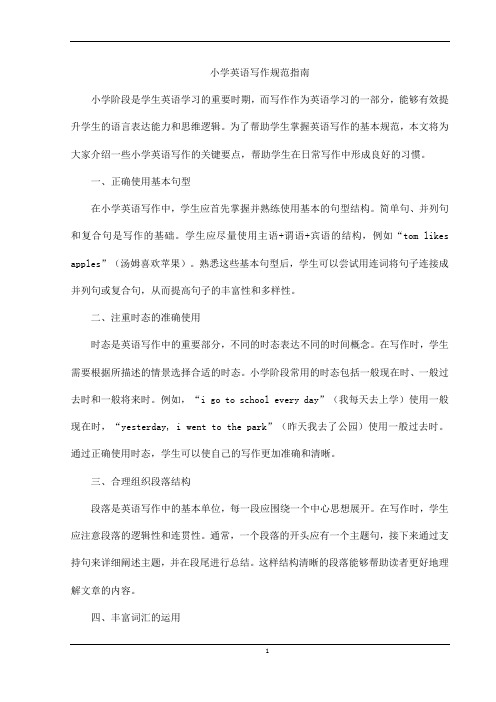
小学英语写作规范指南小学阶段是学生英语学习的重要时期,而写作作为英语学习的一部分,能够有效提升学生的语言表达能力和思维逻辑。
为了帮助学生掌握英语写作的基本规范,本文将为大家介绍一些小学英语写作的关键要点,帮助学生在日常写作中形成良好的习惯。
一、正确使用基本句型在小学英语写作中,学生应首先掌握并熟练使用基本的句型结构。
简单句、并列句和复合句是写作的基础。
学生应尽量使用主语+谓语+宾语的结构,例如“tom likes apples”(汤姆喜欢苹果)。
熟悉这些基本句型后,学生可以尝试用连词将句子连接成并列句或复合句,从而提高句子的丰富性和多样性。
二、注重时态的准确使用时态是英语写作中的重要部分,不同的时态表达不同的时间概念。
在写作时,学生需要根据所描述的情景选择合适的时态。
小学阶段常用的时态包括一般现在时、一般过去时和一般将来时。
例如,“i go to school every day”(我每天去上学)使用一般现在时,“yesterday, i went to the park”(昨天我去了公园)使用一般过去时。
通过正确使用时态,学生可以使自己的写作更加准确和清晰。
三、合理组织段落结构段落是英语写作中的基本单位,每一段应围绕一个中心思想展开。
在写作时,学生应注意段落的逻辑性和连贯性。
通常,一个段落的开头应有一个主题句,接下来通过支持句来详细阐述主题,并在段尾进行总结。
这样结构清晰的段落能够帮助读者更好地理解文章的内容。
四、丰富词汇的运用丰富的词汇是提高英语写作水平的关键。
学生应尽量避免重复使用相同的词汇,可以通过学习同义词来增加写作的多样性。
例如,可以用“happy”代替“glad”,用“big”代替“large”。
此外,学生还应注意不同词汇的适用场景和语境,以确保词汇使用的准确性。
五、正确使用标点符号标点符号在英语写作中起到至关重要的作用,能够帮助分隔句子,使文章结构更加清晰。
在小学英语写作中,常用的标点符号包括句号(.)、逗号(,)、问号(?)和感叹号(!)。
小学英语语法知识点五篇
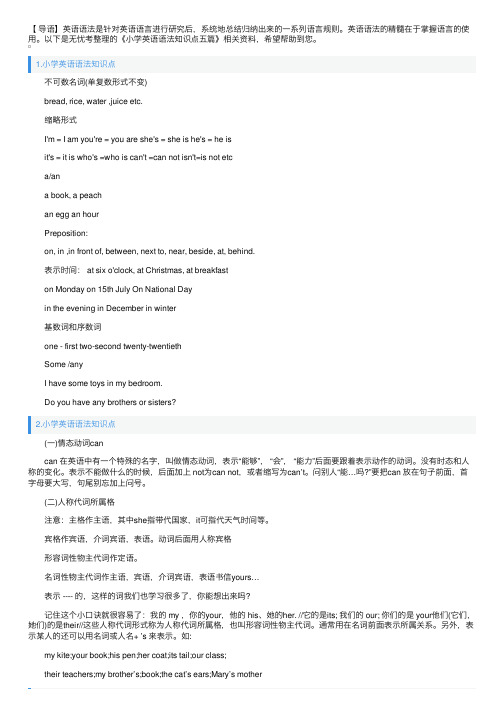
【导语】英语语法是针对英语语⾔进⾏研究后,系统地总结归纳出来的⼀系列语⾔规则。
英语语法的精髓在于掌握语⾔的使⽤。
以下是⽆忧考整理的《⼩学英语语法知识点五篇》相关资料,希望帮助到您。
1.⼩学英语语法知识点 不可数名词(单复数形式不变) bread, rice, water ,juice etc. 缩略形式 I'm = I am you're = you are she's = she is he's = he is it's = it is who's =who is can't =can not isn't=is not etc a/an a book, a peach an egg an hour Preposition: on, in ,in front of, between, next to, near, beside, at, behind. 表⽰时间: at six o'clock, at Christmas, at breakfast on Monday on 15th July On National Day in the evening in December in winter 基数词和序数词 one - first two-second twenty-twentieth Some /any I have some toys in my bedroom. Do you have any brothers or sisters?2.⼩学英语语法知识点 (⼀)情态动词can can 在英语中有⼀个特殊的名字,叫做情态动词,表⽰“能够”, “会”, “能⼒”后⾯要跟着表⽰动作的动词。
没有时态和⼈称的变化。
表⽰不能做什么的时候,后⾯加上 not为can not,或者缩写为can’t。
问别⼈“能…吗?”要把can 放在句⼦前⾯,⾸字母要⼤写,句尾别忘加上问号。
